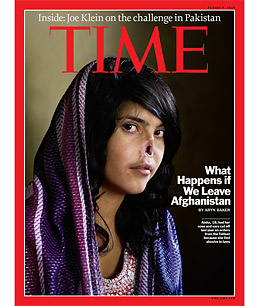Perhaps TIME’s most memorable cover of 2010 featured the image of an Afghan woman who’d had her nose sliced off by the Taliban, with the cover line, “What Happens if We Leave Afghanistan.” The story was a reminder that it’s women who could suffer the most if the Taliban, with its primitive cultural mores, was to regain control of the country, or large parts of it.
But the Obama administration has taken care to argue the merits of the war on the clear basis of security (i.e. al Qaeda) and stability (i.e. Pakistan). You never hear the White House, Pentagon or even State Department citing the welfare of Afghan women as a reason for, as opposed to a fringe benefit of, our military commitment to the country (although Hillary Clinton did write an emphatic late-2001 TIME story on this topic).
Yesterday a frustrated Kathleen Parker decried this mentality in the Washington Post:
But what if this is a false premise? What if saving women from cultures that treat them as chattel was in our strategic and not just moral interest? What if helping women become equal members of a society was the most reliable route to our own security?…
Women are not collateral damage in the fight for security. They are not pet rocks in a rucksack, nor are they sidebars to the main story. They are the story — and should be the core of our foreign policy strategy in Afghanistan as elsewhere.
And today, an equally frustrated Andrew Exum calls this “crazy talk“:
Here’s a hypothetical: What if Mullah Omar, speaking for all the insurgents of Afghanistan, presented a peace deal tomorrow in which he offered to lay down all the arms of Afghanistan’s insurgent groups and renounce al-Qaeda on one condition: that girls in southern Afghanistan would not be allowed to attend school. What should the president do? Should he accept the offer, allowing the war in Afghanistan to end? Or should he say, no, we will stay in Afghanistan and continue to lose American and allied lives and spend billions of dollars each year because we cannot accept an Afghanistan in which women are not allowed to attend school?
This debate must already be occurring within an Obama administration that needs to decide whether it could cut a deal with the Taliban, and on what terms. After his willingness to employ military force on humanitarian grounds in Libya, It would be particularly jarring for Obama to cut a peace deal that, in essence, consigns countless Afghan women to life as chattel. But given the daunting odds of total victory in Afghanistan, and Obama’s obvious desire to extricate the U.S. from that war, it’s not impossible to imagine.

